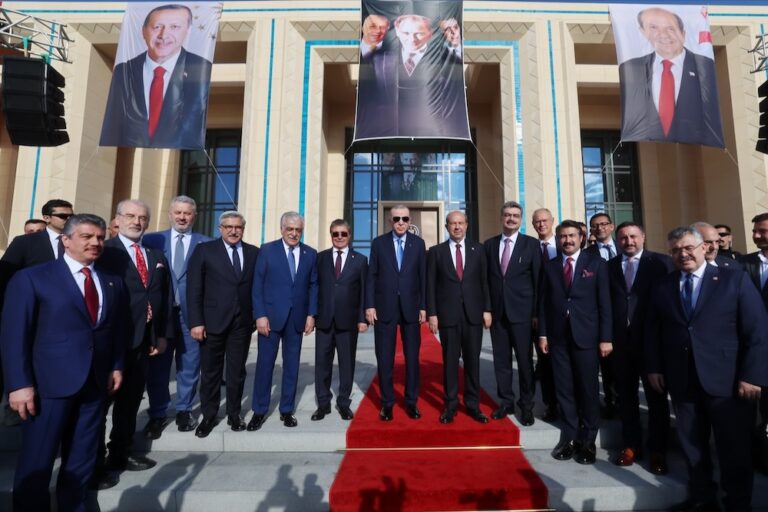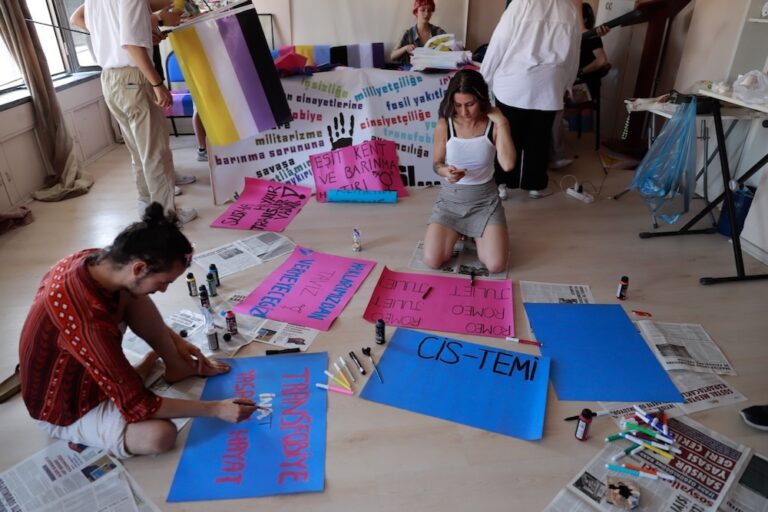(CPJ/IFEX) – According to CPJ, Ragip Duran, a veteran Turkish reporter who has been sentenced to prison in clear violation of internationally recognized standards for a free press, has been summoned to report to a state prosecutor’s office on Tuesday, 16 June 1998, to begin serving a 10-month prison term for violating Article 7 of […]
(CPJ/IFEX) – According to CPJ, Ragip Duran, a veteran Turkish reporter who
has been sentenced to prison in clear violation of internationally
recognized standards for a free
press, has been summoned to report to a state prosecutor’s office on
Tuesday, 16 June 1998, to begin serving a 10-month prison term for violating
Article 7 of the Anti-Terror Law.
Duran is a well-respected journalist who has worked for several newspapers
and news agencies, including Agence France-Presse, the British Broadcasting
Corporation, “Liberation”, “Ozgur Gundem” and other Turkish daily
newspapers. His conviction stems from his interview with Abdullah Ocalan,
leader of the outlawed Kurdistan Workers’ Party (PKK), which appeared in the
now-defunct daily “Ozgur Gundem” on 12 April 1994. His sentence was
confirmed by the Court of Cassation on 23 October 1997, and on 16 February
1998, a state prosecutor granted him a four-month postponement of his
sentence.
CPJ views the conviction and pending imprisonment of Ragip Duran as a
flagrant violation of the most basic right of journalists the right to
“seek, receive, and impart information and ideas through any media and
regardless of frontiers”, as guaranteed by Article 19 of the Universal
Declaration of Human Rights.
Recommended Action
Send appeals to Prime Minister Mesut Yilmaz:
ruling against Ragip Duran in accordance with internationally recognized
norms for press freedom
end the
prosecution and imprisonment of journalists in Turkey for their publication
of news and opinion
Appeals To
His Excellency Mesut Yilmaz
Prime Minister
Basbakanlik
06573 Ankara, Turkey
Fax: +90 312 417 0476 or +90 312 230 8896
Please copy appeals to the source if possible.
The full text of a statement, dated 10 June 1998, issued by CPJ in reaction
to the impending prison sentence of Ragip Duran follows:
CPJ today called on Turkish Prime Minister Mesut Yilmaz to examine all
possible legal
options to rescind the 10-month prison sentence handed down against veteran
journalist Ragip Duran for violating Turkey’s Anti-Terror Law. Duran has
been summoned to report to a state prosecutor’s office on Tuesday, 16 June
1998, to begin serving his sentence, which was confirmed last October by the
Court of Cassation.
Duran is the Istanbul correspondent for the French-language daily
“Liberation” and
has worked for several newspapers and news agencies, including Agence
France-Presse, the British Broadcasting Corporation, “Ozgur Gundem” and
other Turkish daily newspapers. He also teaches media ethics at the
University of Galatasaray. Duran was convicted in December 1994 of
propagandizing on behalf of an outlawed organization under Article 7 of the
Anti-Terror Law. The charge stemmed from his interview with Abdullah Ocalan,
leader of the outlawed Kurdistan Workers’ Party (PKK), which appeared in the
now-defunct daily “Ozgur Gundem” on 12 April 1994.
“One of Turkey’s finest journalists is being sent to jail as punishment for
his thoroughly professional reporting on one of Turkey’s biggest stories”,
said William A. Orme, Jr., CPJ’s executive director. “We hope and expect
that the European Court of Human Rights in Strasbourg will review this case
and rule as it must that the prosecution of Ragip Duran constitutes an
illegal denial of his rights as a journalist and as a citizen of Turkey to
freedom of expression, as guaranteed by European and international human
rights covenants to which Turkey is a signatory.”
The translated text of Duran’s 12 April 1994 interview with Ocalan,
headlined
“Apo 91/ Ocalan 94,” follows:
“I had interviewed the ‘Kurdish Zapata of Damascus’ three years before, in
1991. This time the setting had changed. Ocalan was answering journalists’
questions in a house in Bar Elias, in Lebanon’s northern Bekaa Valley. I
have listened again to the seven-hour cassette recording of the interview
made in Damascus, and compared it with my tape of the Bar Elias interview,
which lasted 13 hours.
“Three years ago, a leader whose military role overshadowed his political
one stood in front of us. Guerrilla was the main card in his hand. This is
still the case today. But Ocalan no longer takes ‘guerrilla’ to mean a
‘militant at war’, in its narrow sense. He says: ‘Only five percent of our
time is dedicated to the war against the enemy. Guerrilla is now basically a
ground on which the new Kurd is being formed.’
“The Ocalan of 1994 is a philosopher and moralist in addition to his
military and political roles. He cites Zarathustra or Freud, he speaks of
psychoanalysis, of spiritual degeneration, and of other human problems.
Ertugru Kurkcu has said: ‘When Ocalan speaks, you seem to hear great noises
coming from his brain, there is no doubt that an intense activity is going
on inside…’
“A diplomatic arena has been added to the PKK’s military and political
planning, together with philosophic and psychological methodologies. It
seems that they have almost created a state mechanism. Everyday Ocalan
receives hundreds of reports from Turkey, Europe, Asia, and the Middle East.
What is the attitude of the leaders of the Western capitals regarding the
Kurdish problem? How are the national and international press covering
events? What are the probable developments? The written and spoken answers
to these questions are sent to Ocalan from the PKK headquarters, which is
equipped with the latest communication equipment. Thus, Ocalan is aware of
all recent events.
“In 1991, Ocalan spoke in general and abstract terms of the United States,
France, or Germany. Today, his observations and analysis of international
policy and different countries’ diplomatic policies are at the level of
discourse found in academic or political reviews in the West. This may be
due to the fact that the Kurdish problem is now part of the international
arena. Ocalan’s policies are consistent, based on concrete analysis and
filled with numerous details.
“The general secretary of the PKK is in Lebanon, but he regularly listens to
Turkish and international radio stations and television channels.
Videocassettes of news or information programs he might have missed are also
sent to ‘the President.’ This is the technical aspect of Ocalan’s position,
the infrastructure of which was not sufficiently developed in 1991. But the
important thing is to make the right analyses and to follow a good policy
with the help of all this information. Ocalan believes that ‘politics is the
art of
concentration.’
“I remember very well that during our 1991 interview in Damascus, Ocalan
had addressed one of his guerrillas saying, ‘What kind of man are you? You
must show that you are a Kurd!’ Moreover, when he criticized the Turkish
Republic, he aimed his arrows at ‘the Turk in general.’ However, on 21 March
1994, when we wished him a Happy Feast, Ocalan replied: ‘the Newroz is not
only my feast but an international one!’
In the new concept Ocalan is formulating of the ‘rearrangement of
Turco-Kurdish relations,’ he gives a lot of importance to equality and
fraternity. He is very critical of narrow minded Kurdish nationalism: ‘The
Kurd cannot exist without Turkey and Turkey cannot survive without Kurds!’
“His relationship with the press has also changed a lot since 1991. Ocalan
has his own way of analyzing the characteristics of each media sector.
During interviews with journalists, he now adopts another language than the
one he uses when addressing his guerrillas which is in fact only natural. He
speaks of the 1968 leader of Dev-Genc (Revolutionary Youth), who is now a
columnist at the “Ozgur Gundem” daily, as ‘our ex-president.’
“At times, the interview at Bar Elias turned into a casual debate while
recording went on. Ocalan in 1994 is calmer and more at ease with himself
than Apo 1991. He laughs and sometimes makes a joke or pun. But he has a
problem: ‘I can’t seem to find anyone to speak with [in the Turkish
government].’
He has said that the PKK does not resemble the PLO, and that he does not
behave like Arafat. In 1991, in Damascus, I had met a Kurdish Zapata. In
1994, at Bar Elias, it was still a Kurd standing before me. Zapata was
standing there was it also Garibaldi?


